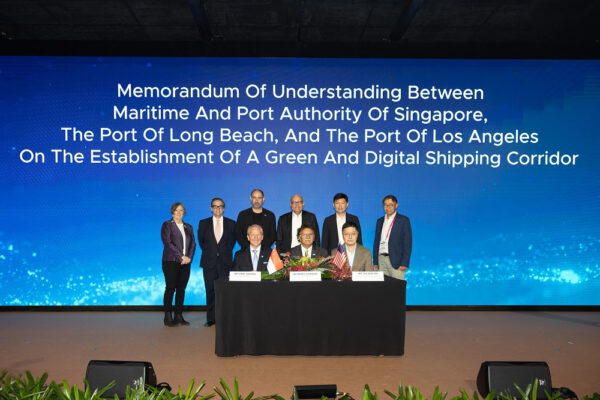The collaboration aimed at decarbonizing ocean cargo transport
The Maritime and Port Authority of Singapore (MPA), Port of Long Beach, and Port of Los Angeles, with the support of C40 Cities, signed a memorandum of understanding today to establish a green and digital shipping corridor between Singapore and the San Pedro Bay ports complex to support the decarbonization of the maritime industry and improve efficiencies through digitalization.
The memorandum was signed by Teo Eng Dih, Chief Executive of MPA; Mario Cordero, Port of Long Beach Executive Director; and Gene Seroka, Executive Director of the Port of Los Angeles. The signing was witnessed by Jonathan Kaplan, United States Ambassador to Singapore; S. Iswaran, Singapore’s Minister for Transport and Minister-in-charge of Trade Relations; Niam Chiang Meng, Chairman of MPA; Sharon L. Weissman, Long Beach Harbor Commission President; and Edward Renwick, Vice President of the Los Angeles Harbor Commission.
“Curbing greenhouse gases from international shipping is essential to fight global warming,” said the Port of Long Beach’s Cordero. “Creating this green corridor with our partner ports and C40 Cities is part of our strategy to coalesce all of our efforts here and beyond to help advance our goals for cleaner marine fuels for oceangoing vessels, improve efficiencies for the global movement of goods, and to achieve a carbon-neutral future.”
“No single port or organization can tackle the challenge of decarbonizing the supply chain alone, no matter how innovative their technology or robust their efforts. The establishment of this green shipping corridor between the San Pedro Bay Port Complex and Singapore will prove to be a living, breathing testament to the power of global collaboration,” said the Port of Los Angeles’ Seroka. “I am honored to be here with key leaders from MPA Singapore, the Port of Long Beach, and C40 Cities to sign this MOU turning a shared commitment to fighting climate change into a meaningful step forward toward the future of global sustainability.”
C40 is the facilitator of the green and digital shipping corridor, providing support to the cities, ports, and their corridor partners by coordinating, convening, facilitating, and providing communications support in furtherance of the corridor’s goals.
As leading hub ports, Singapore, Long Beach and Los Angeles are vital nodes on the trans-Pacific shipping lane and key stakeholders in the maritime sector’s green transition. Ahead of the revision of the International Maritime Organization’s (IMO) Initial Strategy for the Reduction of Greenhouse Gas Emissions from Ships in July 2023, the three ports will come together with the C40 Cities network and other stakeholders in the maritime and energy value chains, to jointly accelerate the decarbonization of the maritime industry in line with the goals of IMO, and Singapore’s and the United States’ respective Nationally Determined Contributions.
The memorandum also builds on the ports’ long-standing cooperation through platforms such as the Port Authorities’ Roundtable and chainPORT, and complements bilateral initiatives between Singapore and the United States such as the U.S.-Singapore Climate Partnership and the U.S.-Singapore Partnership for Growth and Innovation.
John Kerry, U.S. Presidential Climate Envoy, said, “Shipping is responsible for approximately a gigaton of greenhouse gas emissions each year. But the good news is that many shipping companies, ports, and countries are stepping up. Today’s MOU is one of those pieces of good news.”
The green and digital shipping corridor aims to support the transition to low- and zero-emission fuels by ships calling at Singapore and the San Pedro Bay ports complex. The parties will work to facilitate the supply and adoption of these fuels and explore the necessary infrastructure and regulations for bunkering. In addition to identifying and collaborating on pilot and demonstration projects, the memorandum aims to identify digital shipping solutions and develop standards and best practices for green ports and the bunkering of alternative marine fuels, including sharing experiences at international platforms such as IMO.
The memorandum follows from an earlier announcement in November 2022, that Singapore, Long Beach and Los Angeles ports, and C40 Cities had begun discussions to establish a green and digital shipping corridor between Singapore and the San Pedro Bay ports complex. This announcement supported the Green Shipping Challenge launched during the World Leaders’ Summit at the 27th United Nations Climate Change Conference to encourage governments, ports, maritime carriers, cargo owners, and other stakeholders across the maritime value chain to commit to concrete steps to galvanize global action to decarbonize the shipping industry.
“The signing of this MOU signals our collective will to pool our resources, technical insights, industry, and research networks to deliver scalable green as well as digital corridor solutions to help the maritime industry attain the 2050 emission reduction targets expected of the International Maritime Organization and help spur the development of green growth opportunities,” said Teo Eng Dih, Chief Executive of MPA.
“Delivering science-based, rapid, and concrete action on shipping emissions is crucial to ensure the shipping sector decarbonization is aligned with the goal of keeping global heating below 1.5 degrees Celsius. C40 is proud to support this first mover initiative aimed at accelerating the transition to low- and zero-carbon fuels and other decarbonization technologies,” said C40 Cities Executive Director Mark Watts.











